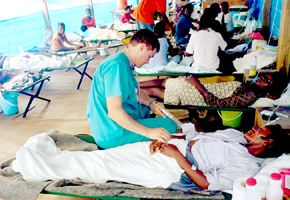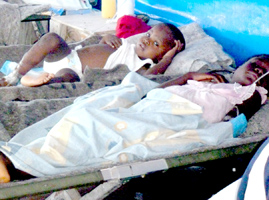(June 10, 2011 - by Ralph Kurtenbach) A medical team from HCJB Global Hands in Ecuador has kept busy treating cholera patients since arriving in Haiti Saturday, June 4, to assist a partner at a tent hospital in Cité Soleil.
Upon arrival last weekend, the five-member team braced for the 12-hour shifts necessary to care for cholera victims at a Samaritan's Purse (SP) cholera treatment center. Team members include nurses Kim Kirk and Sandra Paredes and physicians Mattias Egberth and Mark Nelson. They will be in Haiti for another week.
"The pediatric tent was almost full when we left [at our shift change], which means nearly 40 children," wrote Egberth, a Swedish surgeon who works at HCJB Global Hands' Hospital Vozandes-Shell at the edge of Ecuador's eastern rainforest.
 "We got several transfers which augmented the numbers," Egberth recounted. "We had fewer adults though, so it kind of evened out with a total of around 140 patients."
"We got several transfers which augmented the numbers," Egberth recounted. "We had fewer adults though, so it kind of evened out with a total of around 140 patients."
Just prior to the team's arrival in Haiti, a Pan American Health Organization report estimated that 1,300 patients had been admitted to cholera treatment centers (CTCs) and cholera treatment units (CTUs) in Port-au-Prince that were operating at full capacity.
"It is really an amazing feeling to see that patients that come in nearly unconscious because of dehydration, a few days later can walk home as good as new," wrote Egberth on Friday, June 10. "They are smiling and waving and sometimes you get a hug. It's a great feeling."
Nelson wrote that "patients stay one to five days. I'm not sure why some less and some more, but that is how it is. The diarrhea just keeps going and going, and we give them lots of fluids. Then the diarrhea slows down and the patients go home. They start out lying down, get slowly stronger and then eventually go home. Some are better after 12 liters of fluids, and others take about 50. I`d say the average is 20 to 30 liters."
 He added that there are a "few other things to keep things interesting-pregnant patients, patients with fever (most likely malaria) and a few other odds and ends, but we are supposed to limit things to cholera. Hypertension is common as well."
He added that there are a "few other things to keep things interesting-pregnant patients, patients with fever (most likely malaria) and a few other odds and ends, but we are supposed to limit things to cholera. Hypertension is common as well."
On the negative side, two SP vehicles were subject to armed robberies in the past week. "Now we have an escort of motorcycles on the way back and forth to the CTC," Egberth said. "We pray and hope that nothing more will happen though. Thanks for remembering us in prayer!"
Nelson wrote that the pastor of the church in Cité Soleil "was able to recover the items from the thieves in the first robbery. [SP is] reviewing security and whether any changes are needed in the future."
According to a report on SP's website, "We are working swiftly to admit, treat and heal. God's presence is drawing us together as we go from bed to bed and care for the sick in unison, each person trained in their task. He has prepared us for this time."
SP, involved in different aspects of Haiti's recovery since the devastating earthquake in January 2010, shifted its medical efforts in November to focus solely on treatment of cholera patients in an effort to help control the waterborne disease. Once that crisis passed, the North Carolina-based mission again resumed other aid work. SP had set up 10,000 shelters across the earthquake-affected areas while providing sanitary latrines, water and nutritional training.
Sources: HCJB Global, Samaritan's Purse, Pan American Health Organization
